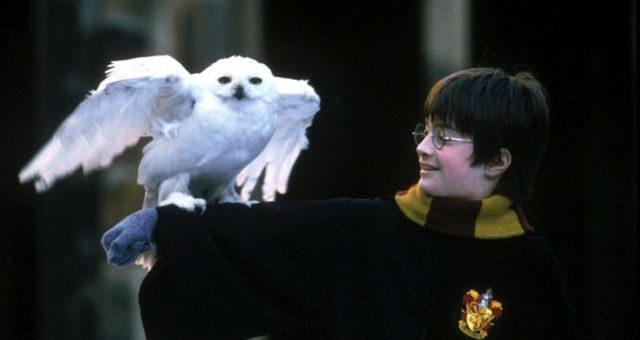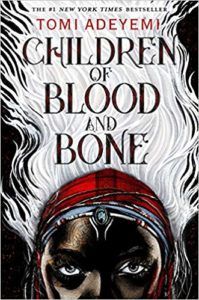
Pointers For Actually Keeping Literary Pets
Are you a dog person? A cat person? Or are you a dragon person, like Anne McCaffrey’s valiant heroes who soar through the skies to battle the inexorable threadfall and don’t even have to burn down a city to make the point that they’re super powerful? Maybe you feel that you’re more of a talking snake kind gal, or a guy who would prefer an ancient and exceedingly wise chinchilla. While I can’t necessarily hook you up with your literary dream pet, I can definitely give you some pointers for actually keeping literary pets that are at least somewhat achievable.
Also, your interest in this post indicates that you might be ready for a fuzzy, scaly, or feathery friend in your life. Head over to Adopt A Pet or Petfinder and get rescued today!
 Children of Blood and Bone by Tomi Adeyemi
Children of Blood and Bone by Tomi Adeyemi
Pet: Nailah
Type: Lionaire
How to keep: As with all cats, rideable lion steeds are opinionated. However, in addition to teeth and razor-sharp claws, these big cats have horns which require some additional respect. Know what you’re doing and have some major confidence before you saddle up. And maybe be able to raise the dead or something, because you’re going to have to top this somehow.
In all seriousness, people do keep big cats as pets and it’s a terrible idea. Think 15 lbs of meat per day, will absolutely escape and maul people, and will require regular vet checkups and good luck finding a vet who will do that. Also, it’s usually illegal. Honestly. Leave the lion-riding to Zélie.
 Harry Potter and the Sorcerer’s Stone by J.K. Rowling
Harry Potter and the Sorcerer’s Stone by J.K. Rowling
Pet: Hedwig
Type: Snowy Owl
How to keep: Snowy owls are bright birds who like to fly. Keep them busy delivering your mail, but bond whenever they execute a task correctly. Treats are a great way to say “thank you.” You’ll never have a better friend than your owl. Treat every day like a bad guy is about to zap your buddy out of the air in the heat of battle, breaking the hearts of readers around the world, because who cares about the brat whose antics have consistently caused drama for the past six books? SAVE THE OWL.
In the U.S., you’re going to have some additional difficulty these beauties as literary pets. First of all, owning a native raptor like the snowy owl is illegal in the states. You’ll have an easier time owning a non-native bird, like the eagle owl, which is an intimidating and fierce predator, or the speckled owl, which is rare and therefore should probably be left alone. Either way, you need extensive training, a permit, and lots of experience. Owls are high strung and tend to shred your stuff, but they’re also not terribly cuddly, so they can be hard to keep in captivity. Because of their many needs, and the paucity of raptor pet-sitters, prepare to never go on vacation again!
 Inland by Téa Obreht
Inland by Téa Obreht
Pet: Burke
Type: Camel
How to keep: Love your camel even when your camel does not love you. Do not sell your camel to shady veterinarians as you and your camel make your lonely way across the last vestiges of the Old West. Give your camel something to drink at least once a week. When your camel has to perform so that you can both make it to the next settlement on a full belly, don that ridiculous costume and perform with your camel. These literary pets mean years of devotion. Also, watch out, they spit.
Raising a camel is a lot like raising a cow, it turns out. They require large animal vets and annual de-worming. They’re also excellent at opening gates with their prehensile lips, so batten down those hatches. Even though camels can go a long time without water and lift a lot of weight, you should water them every day and avoid weighing them down too much. If you do, they won’t love you, and you definitely want your camel on your side.
 Kafka on the Shore by Haruki Murakami
Kafka on the Shore by Haruki Murakami
Pet: Toro
Type: Cat/Concept
How to keep: You’re going to need degrees in philosophy, comparative literature, and probably either particle physics or religious studies to keep conceptual cats as literary pets. The ability to psychically communicate with felines in general is preferred, although after all this work, you’re probably going to decide that it’s better if Toro, or a cat/concept creature like Toro, is just free. Even so, have lots of fresh catnip on hand for when your conceptual cat visits. This will keep them returning to you even when the higher planes call.
Outdoor and free range cats still need their vaccinations. In fact, they vaccinations more than your indoor cat! Capture them once a year for a check-up. (In the case of Toro, consider trying a Faraday cage.) Even conceptual literary pets get turned around now and then, so chip that cat! Also, be prepared to do some extra medical intervention. Our stable and staid modern world is still wild and wooly for felines, and it’s not unusual for them to be accosted by other members of their species or by predators.
 My Side Of The Mountain by Jean Craighead George
My Side Of The Mountain by Jean Craighead George
Pet: Frightful
Type: Peregrine Falcon
How to keep: Meat treats, time, and a nice, thick leather glove. Be ready for your falcon to splatter you with bird poop essentially all the time. This is what you get in exchange for your falcon’s incredible hunting abilities, which I assume is helping you to survive in the wilderness of your self-imposed preteen exile. Otherwise, you’ll need to be a licensed falconer and yes that really is a thing. In fact, if you try to keep any raptor without a license to do so, you will be in violation of the law.
Becoming a licensed falconer is extremely expensive and, since it involves an apprenticeship and regular inspections of your home by government officials, time consuming. Add to that the fact that falcons need to be flown daily and allowed to hunt. Finding a vet capable of keeping your falcon healthy can be a challenge too, and just like with your lion, you’ll need to build a special enclosure. Expect to get “nailed” (i.e. stabbed with a talon) on the regular.
 Runaways by Brian K. Vaughan
Runaways by Brian K. Vaughan
Pet: Old Lace
Type: Raptor
How to keep: Psychic mind links are helpful when dealing with the prehistoric killer varieties of literary pets. Keep in mind that these obligate carnivores need to hunt in order to remain psychologically healthy. Kibble will not do in this case! Be advised that raptors are more like birds than traditional lizards. They’re extremely social and intelligent and will eat you if you fail to bond with them. Toys are a must. Some kind of convenient sci-fi explanation for your ability to prevent your raptor from sinking its magnificent fangs into everyone ahead of you in the grocery line is preferred.
Obviously, we’re not completely sure how to keep an actual deinonychus in captivity, because nobody’s tried it in real life before. You’ll be the first! However, raptors like peregrine falcons and owls, as well as carnivorous flock birds like crows and chickens, may give us clues to their behavior. (And yes, chickens are carnivorous. Ever seen one with a mouse? Ain’t pretty!) Fossil records suggest that raptor dinos flocked, which means you may need to keep a few of them together to keep them happy. Don’t be surprised if a pecking order emerges. Expect to feed them each 15 pounds of meat a day, just like with a big cat.
Want to see some cuddly comics pets? Check out our post on 11 of the best animal friends in graphic novels! There are more than a few books out there just about pets, too. Check them out here!




 Harry Potter and the Sorcerer’s Stone
Harry Potter and the Sorcerer’s Stone Inland
Inland Kafka on the Shore
Kafka on the Shore
 Runaways
Runaways










